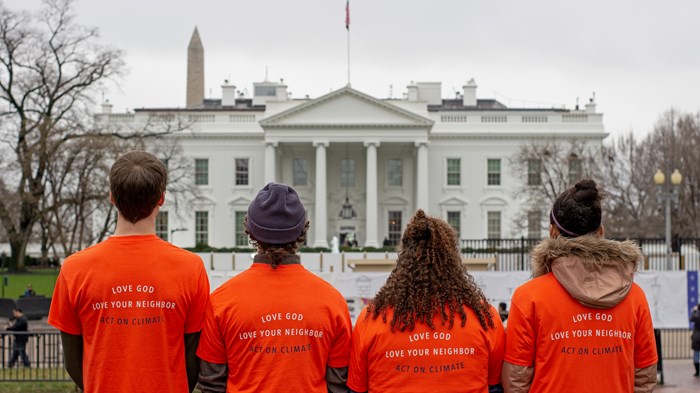Why Young Christians Are Pursuing Climate Action as an Urgent Calling

Around the world, young people are frontlining efforts to address climate change —and that includes activating churches. A growing number of young Christians, like 27-year-old Tori Goebel, see environmental action as an essential expression of their faith.
Growing up in New England, Tori enjoyed nature, but conversations about “creation care” weren’t common in her Christian home or church. After learning more about climate change and its impact, Tori thought it only made sense that Christians would take action — “not just because God tells us to care for creation,” she says, “but also because we are supposed to love our neighbors, who are suffering from devastating climate impacts like rising sea levels, food insecurity, extreme weather, and drought.”
In January 2021, Tori became National Organizer and Spokesperson for Young Evangelicals for Climate Action (YECA), an organization that has engaged 25,000 young people since 2012—mobilizing students, influencing church leaders, and holding politicians accountable to address climate change at a systemic level. Our conversation has been edited for length.
Sarah Holcomb: Why do young Christians say they’re drawn to climate action?
Tori Goebel: Young people are coming to this work through the lens of faith. They’re also driven to join because their church leaders weren’t talking about creation care when they were growing up— and may still not be talking about it. Young Christians are compelled to work not just with their peers, but with church leaders. They want to see their churches — and Christian colleges and institutions— take climate change seriously. They’re not coming from a place of judgement, but a place of love. They’re after meaningful change.
SH: How do younger and older evangelicals approach environmental issues?
TG: We know there is a generational divide. Reports show that young people, no matter their faith, are more aware of climate change issues and open to climate change solutions than older generations— and that’s regardless of their political party. Misinformation campaigns have also stirred mistrust of climate science among Christian communities, particularly older generations.
At the same time, some older American evangelicals are very passionate about environmental issues. I’ve noticed that young people tend to care a lot about climate change and environmental justice; for older evangelicals, it’s often energy and clean air and water that bring them to table.
SH: How can we bridge the divide among Christians on climate change?
TG: Climate science is important, but it isn’t always the most compelling. In fact, climate scientists like Katharine Hayhoe don't lead with the data. The volume of information can be overwhelming. That’s why we tell the stories of people who are impacted. Of course we still use science, and as Christians, we ground everything in scripture, showing how caring for God’s creation is an integral part of faith.
We also focus on shared values. In conversations with people who are pro-life, for example, we can connect how climate change impacts maternal health and children’s health and development. People who are concerned about the economy and job creation have reasons to care about climate. An important strategy is affirming people’s identities and beliefs: Creation care doesn’t mean turning back on your values, but living into them more fully.
SH: What are the next steps for climate action?
TG: Over the past four years many important environmental policies were rolled back. It’s time to get moving. At YECA, we’ll continue to apply pressure. For example, we need to make sure we’re not bailing out fossil fuel programs in Covid relief bills, but instead investing in good jobs for families in clean energy. We have opportunities as we recover from Covid-19 to become more environmentally sustainable. Some of these efforts must be led by evangelicals.
SH: How might engaging in environmental issues transform Christian communities?
TG: There are so many ways! I know many young people who have left or been tempted to leave the Church, not out of anger or hatred, but frustration. We see creation care as part of our faith. When churches don’t take climate issues seriously, it’s hard for young people to stay involved. Embracing creation care is not a strategy for bringing people back to the pews—it’s just a way to be authentic to our calling.
Creation care also deepens our spiritual formation. I often feel closest to God when I’m doing things that help restore the relationship between people and the land, like gardening. Understanding our role as God’s creation—and how we are interconnected—is both meaningful for people and transformational for the church.
Don’t miss another post—subscribe to bi-monthly digests of top articles from the Better Samaritan.
Recently it’s become especially clear that many white American evangelicals are not always the best representatives of Christ. Rather than focusing on political power or electing conservative politicians, which evangelicals in the news tend to do, I believe we’re called to focus on the reconciling work of Christ—restoring broken relationships between us and our neighbors, humans and God’s creation. Creation care is part of reawakening that the white evangelical church in America needs right now.
Tori Goebel serves as the National Organizer and Spokesperson for Young Evangelicals for Climate Action. She holds an undergraduate degree in communications and political science from Gordon College (B.A. '16) and a masters of environmental law and policy from Vermont Law School (M.E.L.P. '19). Tori was born and raised in New England and currently lives in the Boston area.
Sarah Holcomb covers faith and social and environmental movements. She is the editor for Changemakers, an online publication of Ashoka, as well as a freelance journalist whose work has been featured in CT, The New Humanitarian, Next City, and others. Sarah graduated from Wheaton College (IL), where she studied journalism and Human Needs and Global Resources, and currently lives in the D.C. area.
The Better Samaritan is a part of CT's
Blog Forum. Support the work of CT.
Subscribe and get one year free.
The views of the blogger do not necessarily reflect those of Christianity Today.






















